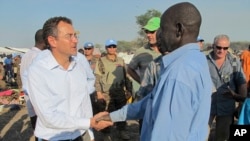The United Nations Security Council on Wednesday expressed concern over recent devlopments in South Sudan, including the expulsion of Toby Lanzer, the U.N.'s Humanitarian Coordinator.
In a statement, members of the Security Council said expelling Lanzer "shows a disregard for the plight of the South Sudanese people and for the essential role the international community, in particular the United Nations, is playing to address the dire humanitarian crisis and deliver hope to the people."
The Security Council noted that the expulsion order came hard on the heels of a warning by the World Food Program "that South Sudan is facing the worst levels of food insecurity in the young country’s history because of a combination of conflict, high food prices and a worsening economic crisis."
In a report released at the end of May, the U.N. Office for the Coordination of Humanitarian Affairs (OCHA) in South Sudan said more than two million people have been displaced by the fighting in South Sudan, and more than 4 million will need emergency assistance this year.
The Security Council reiterated that sanctions against anyone seen to be blocking peace in South Sudan are still on the table. Earlier this year the Council voted to adopt a framework for sanctions.
Comment on 'collapsing' economy
A spokesman for South Sudanese President Salva Kiir said earlier this week that Lanzer is being expelled because of comments he made about South Sudan's "collapsing" economy.
Lanzer allegedly made the statement last month as inflation skyrocketed, essential goods became scarce, and thousands of people were going hungry and fleeing their homes in Unity and Upper Nile states, where there has been renewed fighting in recent weeks.
All of South Sudan’s oil, which brings in the lion's share of the government's revenues, is produced in Unity and Upper Nile. International sources have said oil production has been severely disrupted by nearly 18 months of crisis in South Sudan, and oil workers have been pulled out of Upper Nile since fighting flared there at the end of April. But the government has insisted that it is still in control of the fields in Upper Nile and that no oil workers have left.
The United States, European Commission and U.N. Secretary-General Ban Ki-moon have called on President Salva Kiir to reverse the order to expel Lanzer.
A British national, Lanzer was appointed by Ban as the U.N. Humanitarian Coordinator in South Sudan in July 2012. Since South Sudan plunged into conflict in December 2013, Lanzer has been an outspoken advocate for peace and has traveled throughout South Sudan to see first-hand the impact of the fighting on people’s lives.
Lanzer is due to take up a new U.N. posting in West Africa at the end of this month. He was not in South Sudan when the government announced last week that it intends to expel him. A deputy spokesman for Ban, Farhan Haq, told South Sudan in Focus that any attempt on the part of the South Sudan government to bar Lanzer from re-entering the country would be "unacceptable."




